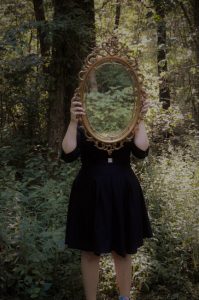Podcast by HLTD51 student Teaformeplease
In this podcast, I examine how Philip Larkin’s poem The Old Fools (read or listen) critiques the concept of age and aging as decline. Despite the pessimism of its opening stanza, Larkin’s poem ultimately persuades us to think of aging along the lines of what age critics like Mary Russo call “The Scandal of Anachronism” (see her essay in Figuring Age: Women, Bodies, Generations), by reflecting directly back at us our contemporary fears of aging as depressing, and regressive.
Photo by Tasha Kamrowski
TRANSCRIPT:
Western society tends to view aging through stages, stages in which our identity become intermingled with common tropes of aging such as decline, loss of autonomy and loss of physical ability. To begin, Larkin mocks the old for not choosing to resist aging, we can see this in the first stanza when he says “do they somehow suppose…they could alter things back.” The key idea here is to choose, choosing to resist obsolesce and aging is what Western society values, because to go out of fashion is bad—it is something our society rejects and with it comes scorn, pity, and ridicule.
The second point Larkin wants to convey in this poem is that Western society views aging and dying as inherently natural. This can be seen in stanza 2. “it’s only oblivion true… of being here.” And so here Larkin addresses progress, hasn’t life and nature always been progressive? Afterall, before the existance of the universe, there was nothing, and the progress of nature is what brought us here, progress is what brought to bloom the million pedalled flower—of humanity. And so we can’t ignore nature, because nature tells us when its time to go, and it does this through its physical manifestations of “ash hair, toad hands, prune face dried into lines.”
The next idea that Larkin addresses is how Western society views aging as the inability to live. “Perhaps being old is having lighted rooms inside your head…this is where they live.” Here Larkin conveys the idea of old as being unable to live and to create new memories because they live in the past. “Not here and now, but where all happened once.”
Furthermore, aging is associated with the fragmentation of identity. This is seen in stanza 4 when Larkin describes the identity of the old as “rooms that grow father, leaving incompetent cold, the constant wear and tear of taken breath.” And so through aging, the identity of the old identity becomes fragmented just like the rooms in our head, or in other words, our sense of self, grow father apart. Until the identity of the elderly become like the whole hideous inverted childhood, a stage in which can be seen at the end of what Western society considers, the stages of life.
At the end, Larkin surprises us by telling us that “we shall find out” we shall find out for ourselves, how aging is truely like, there is a reflexive quality in this last line when he puts us in our place and tries to address our ignorance and narrow minded ways of thinking about aging as merely a fixed set of patterns, and asks us to reconsider what aging might mean because one day, we too will experience old age. And so perhaps this poem is a critique on how we should expand our hozion to encompass thinking about age as possibility, rather than as charactized by decline and limitations.
